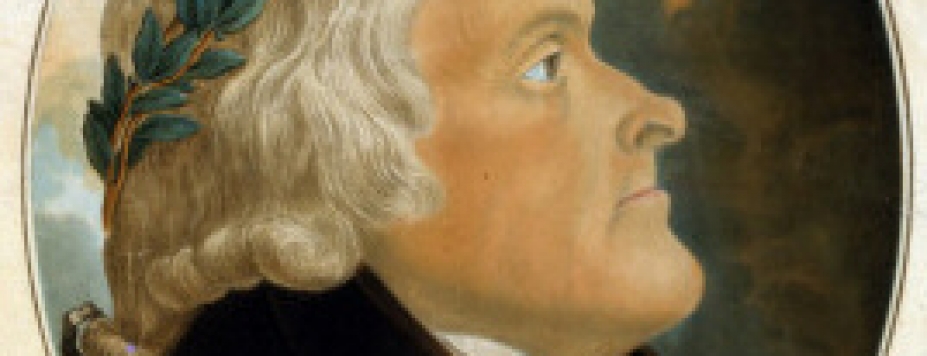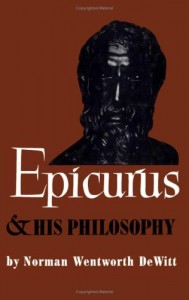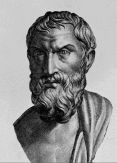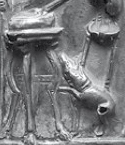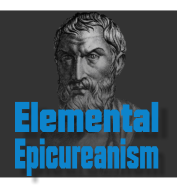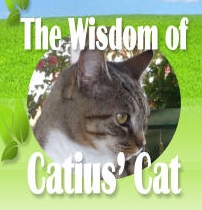Peace and Safety to the Epicureans of today, no matter where you might be!
I know that some find it odd, and others find it tedious, that I am forever pointing out the differences between Stoicism and Epicureanism. And then there are those who as simply mystified why Epicurus would leave “reason” out of the “Canon of Truth” – the three categories of measuring tools by which truth is determined. Today’s Twentieth Post may strike some as more confusion, but I hope it will help explain why the issue is important and what is at stake. In my view, it is as much of an error to assert that “Reason” is superior to Nature as it is to assert that “Religion” is superior to Nature. Epicurus did not simply reject the false arguments of religion – he rejected the false arguments of those who asserted that they could “reason” their way to a “virtue” higher than the goal of pleasurable living set by Nature.
To set off this argument in greater detail, here is a particularly important passage from Jefferson’s “Head and Heart” letter. The context is Jefferson holding a dialogue between the his Head, representing the forces of Reason, and his Heart, representing the guidance of Nature through Pleasure. I hope this excerpt prompts you to want to read the entire letter, which is here.
I pick up the sequence is mid-debate. The Head has asserted the superior role of calculation in life, and has argued in typical Stoic fashion: “I wished to make you sensible how imprudent it is to place your affections, without reserve, on objects you must so soon lose, & whose loss when it comes must cost you such severe pangs.”
Here is the response of the Heart, which in my view Epicurus would endorse:
Heart. And what more sublime delight than to mingle tears with one whom the hand of heaven hath smitten! To watch over the bed of sickness, & to beguile its redious & its painful moments! To share our bread with one to whom misfortune has left none! This world abounds indeed with misery: to lighten its burthen we must divide it with one another. But let us now try the virtues of your mathematical balance, & as you have put into one scale the burthen of friendship, let me put its comforts into the other. When languishing then under disease, how grateful is the solace of our friends! How are we penetrated with their assiduities & attentions! How much are we supported by their encouragements & kind offices! When heaven has taken from us some object of our love, how sweet is it to have a bosom whereon to recline our heads, & into which we may pour the torrent of our tears! Grief, with such a comfort, is almost a luxury! In a life where we are perpetually exposed to want & accident, yours is a wonderful proposition, to insulate ourselves, to retire from all aid, & to wrap ourselves in the mantle of self-sufficiency! For assuredly nobody will care for him who care for nobody. But friendship is precious, not only in the shade but in the sunshine of life; & thanks to a benevolent arrangement of things, the greater part of life is sunshine.
I will recur for proof to the days we have lately passed. On these indeed the sun shone brightly. How gay did the face of nature appear! Hills, valleys, chateaux, gardens, rivers, every object wore its liveliest hue! Whence did they borrow it? From the presence of our charming companion. They were pleasing, because she seemed pleased. Alone, the scene would have been dull & insipid: the participation of it with her gave it relish. Let the gloomy monk, sequestered from the world, seek unsocial pleasures in the bottom of his cell! Let the sublimated philosopher grasp visionary happiness while pursuing phantoms dressed in the garb of truth! Their supreme wisdom is supreme folly; & they mistake for happiness the mere absence of pain. Had they ever felt the solid pleasure of one generous spasm of the heart, they would exchange for it all the frigid speculations of their lives, which you have been vaunting in such elevated terms.
Believe me then my friend, that that is a miserable arithmetic which, could estimate friendship at nothing, or at less than nothing. Respect for you has induced me to enter into this discussion, & to hear principles uttered which I detest & abjure. Respect for myself now obliges me to recall you into the proper limits of your office. When nature assigned us the same habitation, she gave us over it a divided empire. To you she allotted the field of science; to me that of morals. When the circle is to be squared, or the orbit of a comet to be traced; when the arch of greatest strength, or the solid of least resistance is to be investigated, take up the problem; it is yours; nature has given me no cognizance of it. In like manner, in denying to you the feelings of sympathy, of benevolence, of gratitude, of justice, of love, of friendship, she has excluded you from their controul. To these she has adapted the mechanism of the heart. Morals were too essential to the happiness of man to be risked on the incertain combinations of the head. She laid their foundation therefore in sentiment, not in science. That she gave to all, as necessary to all: this to a few only, as sufficing with a few. I know indeed that you pretend authority to the sovereign controul of our conduct in all its parts: & a respect for your grave saws & maxims, a desire to do what is right, has sometimes induced me to conform to your counsels.
A few facts however which I can readily recall to your memory, will suffice to prove to you that nature has not organized you for our moral direction. When the poor wearied souldier whom we overtook at Chickahomony with his pack on his back, begged us to let him get up behind our chariot, you began to calculate that the road was full of souldiers, & that if all should be taken up our horses would fail in their journey. We drove on therefore. But soon becoming sensible you had made me do wrong, that tho we cannot relieve all the distressed we should relieve as many as we can, I turned about to take up the souldier; but he had entered a bye path, & was no more to be found; & from that moment to this I could never find him out to ask his forgiveness. Again, when the poor woman came o ask a charity in Philadelphia, you whispered that she looked like a drunkard, & that half a dollar was enough to give her for the ale-house. Those who want the dispositions to give, easily find reasons why they ought not to give. When I sought her out afterwards, & did what I should have done at first, you know that she employed the money immediately towards placing her child at school. If our country, when pressed with wrongs at the point of the bayonet, had been governed by its heads instead of its hearts, where should we have been now? Hanging on a gallows as high as Hamans.
You began to calculate & to compare wealth and numbers: we threw up a few pulsations of our warmest blood; we supplied enthusiasm against wealth and numbers; we put our existence to the hazard when the hazard seemed against us, and we saved our country: justifying at the same time the ways of Providence, whose precept is to do always what is right, and leave the issue to him. In short, my friend, as far as my recollection serves me, I do not know that I ever did a good thing on your suggestion, or a dirty one without it. I do forever then disclaim your interference in my province. Fill papers as you please with triangles & squares: try how many ways you can hang & combine them together. I shall never envy nor controul your sublime delights. But leave me to decide when & where friendships are to be contracted. You say I contract them at random. So you said the woman at Philadelphia was a drunkard. I receive no one into my esteem till I know they are worthy of it. Wealth, title, office, are no recommendations to my friendship. On the contrary great good qualities are requisite to make amends for their having wealth, title, & office. You confess that in the present case I could not have made a worthier choice. You only object that I was so soon to lose them. We are not immortal ourselves, my friend; how can we expect our enjoyments to be so? We have no rose without its thorn; no pleasure without alloy. It is the law of our existence; & we must acquiesce. It is the condition annexed to all our pleasures, not by us who receive, but by him who gives them. True, this condition is pressing cruelly on me at this moment. I feel more fit for death than life. But when I look back on the pleasures of which it is the consequence, I am conscious they were worth the price I am paying.
As Jefferson says, the greater part of life is sunshine, but we will never appreciate it if we bind ourselves to the sterile calculations of those who hold “Reason,” as others hold “Religion,” to be superior to Nature.
Peace and safety to you all!
_________________
As Seneca recorded: Sic fac omnia tamquam spectet Epicurus! So do all things as though watching were Epicurus!
And as Philodemus wrote: “I will be faithful to Epicurus, according to whom it has been my choice to live.“ughts and topics, and I commend his entire article to you so that you can yourself not simply defer to Epirucus, but reason the issue through to you own conclusion.




